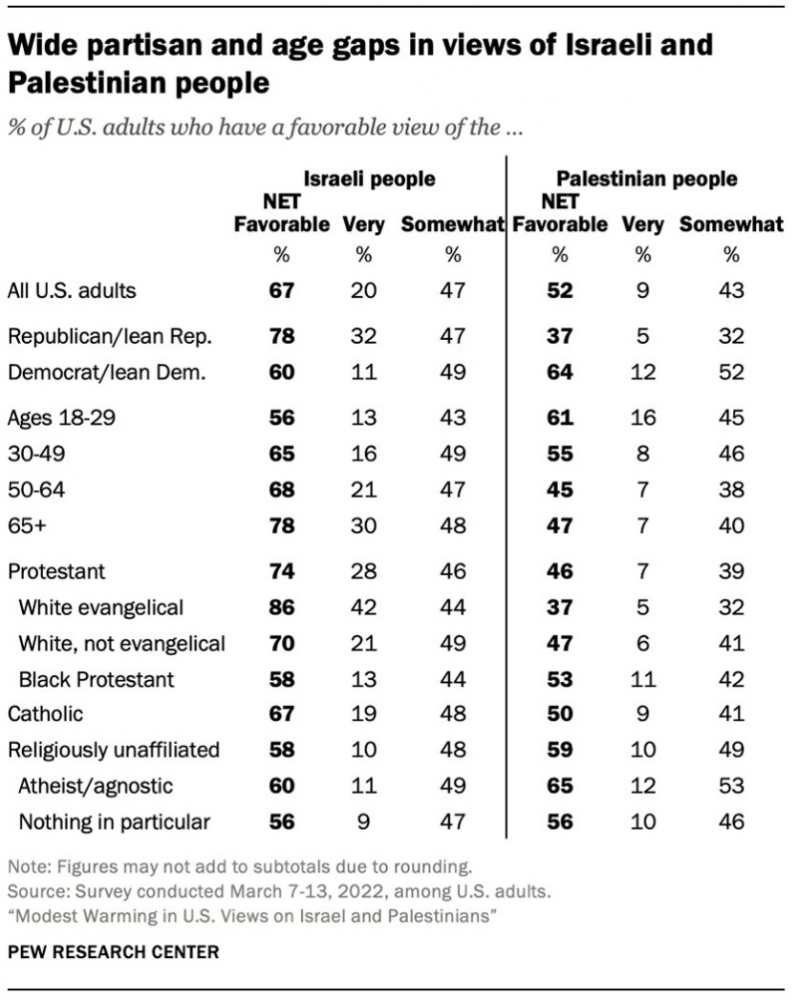United States
RNS
Earlier this week, 12 Republican senators sent a letter to US Secretary of State Antony Blinken, asking to rescind the $US1 million grants the State Department gives to “anti-Israel NGOs”.
The Republican senators’ staunch support for Israel is not surprising, according to a new Pew Research survey of US attitudes toward Israel and Palestine. Republicans and those who lean toward the Republican Party express far more positive views of the Israeli people and its government than do Democrats – 78 per cent of Republicans view Israeli people positively compared with 60 per cent of Democrats.

A view of the Dome of the Rock and Jerusalem’s Old City, behind an Israeli flag, seen from the Mount of Olives on 6th December, 2017. PICTURE: AP Photo/Oded Balilty.
But white evangelicals, most of whom are proud Republicans, have the strongest views of Israelis. A whopping 86 per cent of white evangelicals said they felt warmly toward Israelis – more than any other Christian group. By comparison, only 58 per cent of Black Protestants felt warmly toward Israelis.
Overall, the survey of 10,441 US adults, taken in March, found that two-thirds of Americans express at least a somewhat favourable view of the Israeli people. But it also found a modest warming to Palestinians, among younger Americans, and a general lack of familiarity and support for the Boycott Divestment and Sanctions movement, which aims to press Israel to change its policies toward the Palestinians.
As with so many other political issues (abortion, immigration, race, guns), white evangelicals stand out from other religious groups in their views. When it comes to Israel, those views appear firmly rooted in their faith.
The survey found that 70 per cent of white evangelicals believe God gave the land of Israel to the Jewish people. By comparison, only 32 per cent of US Jews felt God gave Israel to the Jewish people, according to a 2020 Pew survey, which asked a similar (but not identical) question.
“It’s important to their theological narrative,” said Arielle Levites, research assistant professor at George Washington University, referring to white evangelicals. “It’s important to their own sense of the arc of history.”
Many evangelicals view the creation of Israel in 1948 as a fulfillment of biblical prophecy that would usher in Jesus’ return, although the survey did not ask about this.
It’s perhaps not surprising that evangelicals scored lowest in their estimation of Palestinians (37 per cent), even as some Palestinians are fellow Christians (the majority are Muslim).
White evangelicals are also the religious group most likely to express a very or somewhat favorable view of the Israeli government (68 per cent), compared with Catholics (50 per cent), white Protestants who are not evangelical (51 per cent), Black Protestants (43 per cent) and religiously unaffiliated people (31 per cent). The survey did not have sufficient respondents from Jewish, Muslim or other faith traditions to report on their responses.

The survey, the second of its kind since 2019, also found a growing generational divide, with younger Americans feeling much warmer toward Palestinians. Americans age 30 and younger view Palestinians slightly more favorably than Israelis (61 per cent vs. 56 per cent). Overall 67 per cent of Americans expressed favourable views of Israelis and 52 per cent expressed favorable views of Palestinians.
That generational change in US attitudes toward Israel was reflected in another survey, commissioned by University of North Carolina at Pembroke researchers and carried out by Barna Group. That 2021 survey found younger evangelicals are much less supportive of Israel than older evangelicals. Support for Israel among young evangelicals plunged from 75 per cent to 34 per cent between 2018 and 2021.
“Clearly there’s more favorable views of Palestinians among younger people,” said Ariela Keysar, associate research professor at Trinity College in Hartford, Connecticut. “I see it as a kind of generational memory. Older people see Israel pre-1948, before Israel was established as a democracy surrounded by hostile Arab countries. Younger people are shaped by current events. Many encounter anti-Israel views on campus. They encounter protests. Older people have not been exposed to that.”
Perhaps most surprising in the survey, 84 per cent of Americans said they have heard “not much” or “nothing at all” about the Boycott Divestment and Sanctions movement.
The BDS movement, launched by Palestinian groups in 2005, states that “Israel is occupying and colonizing Palestinian land, discriminating against Palestinian citizens of Israel and denying Palestinian refugees the right to return to their homes.”
Americans, both Democrats and Republicans, young and old, and of various Christian persuasions had relatively uniform views on BDS – that is, they professed ignorance.
“BDS gets a lot of heat among a very small percentage of people,” said Ari Y Kelman, associate professor of education and Jewish studies at Stanford University’s Graduate School of Education. “It’s not galvanizing people as an organisational strategy, like divestment from South Africa managed to do for a much broader swath of the population.”
Overall, five per cent of Americans say they support the BDS movement against Israel.
Asked about possible outcomes for the Israeli-Palestinian conflict, the survey found that 35 per cent of Americans favoured a two-state solution, in which the land would be split between Israelis and Palestinians, and 27 per cent favoured a one-state solution. More than a third – 37 per cent – said they weren’t sure what the solution to the conflict should be.
The margin of error for the full survey of 10,441 respondents was plus or minus 1.5 percentage points.





